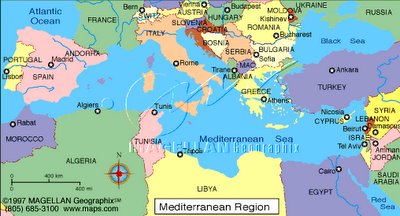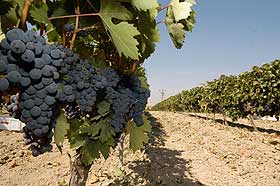
A few years back, I hosted a wine tasting at which I supplied the basic lineup but invited guests to bring a bottle along. The catch: It had to be from a country bordering the Mediterranean.
The average person's geographic knowledge being, regrettably, as shaky as it is, many of them were lost once they got past a short list covering Spain, Italy, Greece and France. Some suggested Portugal, then realized that was off base after checking a map. Others automatically excluded a number of countries, assuming no wine would come from predominantly Muslim countries. Still others did their homework.
By the time the evening was over, everyone knew you could find wines from such Mediterranean-bordering lands as Turkey, Slovenia, Greece, Albania, Croatia, Morocco, Israel, Lebanon, Jordan, Algeria, Tunisia, Syria and Egypt.
While most of those countries don’t produce what most people would regard as fine wines, you can find a few gems if you look hard enough.
I regard Slovenian wines, for example, as the Rumanian wine of the 2000s. Just as Rumania was sending us dirt-cheap, big-taste reds from the Premiat winery back then, Slovenia is sending us dirt-cheap, big-taste reds from the Avia winery today.
One of these days Turkish wines may regain the cache they had in bygone eras. Wine grape cultivation is increasing in that bi-continental nation on the eastern end of the Mediterranean, a region that in biblical times was known for its high-quality wine and which some modern researchers believe may well have been where wine originated.
The topic of wine-grape growing and winemaking can be prickly in Turkey, where Christian and Muslim practices sometimes clash.
Of course, when it comes to reality checks, commerce often trumps everything else. Take Wine Istanbul 2006, a trade show that was part of the 5th annual Gourmex Fair that just wrapped up in the Turkish capital of Istanbul.
Among the gourmet products being displayed and sold there to a gaggle of industry insiders will be wine, raki, vodka, whiskey, cognac and beer, according to its organizers. And, to show it's not a passing fancy, the show will offer exhibits of wine production equipments.
One example of the uptick in Turkish wine interest can be seen in a rural area of central Anatolia, about 65 miles north of the capital of Ankara. There along the Kizilirmak river in an area of treeless hills, about 20 of the 40 families in the tiny village of Uyurca grow wine grapes.
When the Ozbek family began planting grapes, "Our neighbors said it was wrong, against Islam, to produce wine. They said our soil would dry up and it would no longer rain or snow. But that was more than 10 years ago," Cengiz Ozbek, 37, said in an interview with IOL, a South African news service. "Then they saw how much money we started to make. Now they, too, are planting vineyards."
Turkey is the No. 4 producer of grapes in the world, but only 2% is used in wine production.
As IOL notes, "Nearly all Turks are nominally Muslim, but the country's secular system keeps religion on a tight rein and has long fostered a tolerant attitude towards alcohol despite the Koran's teaching that it is sinful."
"The old imam here was against the vineyards, but he left and was replaced by a younger, more pragmatic man who says it is a matter for the individual's own conscience," Ozbek said.
 Uyurca boasts a mild microclimate and soil ideal for grapes. The villagers now produce about 500 tons of grapes annually, up from just 12 tons in their first harvest in 1996. It sells its entire production to Kavaklidere, Turkey's largest winemaker.
Uyurca boasts a mild microclimate and soil ideal for grapes. The villagers now produce about 500 tons of grapes annually, up from just 12 tons in their first harvest in 1996. It sells its entire production to Kavaklidere, Turkey's largest winemaker.At one time, Christian Greeks and Armenians dominated the Turkish wine industry. When the empire collapsed after World War I, many left Turkey. Kavaklidere was founded by Turkish entrepreneurs in Ankara in 1929 and had the support of Mustafa Kemal Ataturk, president and founder of modern Turkey.
Today, Kavaklidere has a production capacity of 18.5 million liters and a 35% share of Turkey's registered wine market. It exports about 20 percent of its total production, mostly to Europe. Its best-selling wines are Kalecik Karasi, Okuzgozu and Narince.
Another major player is Doluca, which got a $15 million upgrade two years ago that resulted in a new winery with the latest winemaking technology. Doluca has an annual production of 10 million bottles, with Villa Doluca and Ozel Kav its leading labels.
The main hassles Turkish wineries are facing today are a large illegal liquor market, which is cutting into domestic sales of alcoholic beverages and an ever-increasing tax burden. Tax on wine has grown by more than 100% since the Justice and Development Party (AKP), an Islamic group, came to power in 2002. Tax on beer has risen by 50% and on raki, the most popular liquor, 26%.
The AKP says it has no plans to outlaw alcohol, insisting it only wants better regulation of the trade.
As to the quality of Turkish wines, the smaller, independent wineries turn out some interesting blends. Kavakladire's mass-market wines are a decent middle-of-the-road product. Noted wine writer Daniel Rogov offers his tasting notes on a fairly broad range of Turkish wines I have found helpful.
To Dowd's Spirits Notebook latest entry.
To Dowd's Wine Notebook latest entry.
To Dowd's Brews Notebook latest entry.
Back to Dowd's Bar Blog home page.
No comments:
Post a Comment